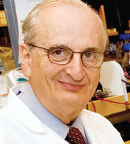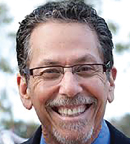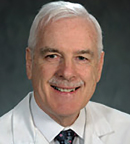Surgeons are clearly more comfortable in the operating room than the laboratory, but there is a place for them in translational cancer research as well, according to one surgeon who has led cutting-edge research in pancreatic cancer.
“Translational studies require access to patients, to tissue, and to data on clinical outcomes. It’s something that we surgeons have,” said Jeffrey A. Drebin, MD, PhD, the John Rhea Barton Professor and Chairman of the Department of Surgery at Perelman School of Medicine, University of Pennsylvania, Philadelphia. Dr. Drebin aimed to inspire attendees at the Society of Surgical Oncology Annual Cancer Symposium with his Presidential Address.1 He began by acknowledging, “Many think that surgeons who do research are like talking dogs: They need not do it well; in fact, it’s a wonder that they can do it at all! But for many of us in academic centers,” Dr. Drebin added, “performing research is one of our missions.”

Judah Folkman, MD
To make his case, Dr. Drebin drew from the words of Judah Folkman, MD, the “father” of angiogenesis: “As long as there is an unconquered disease, an injury that cannot be repaired, or a method of prevention that remains beyond reach, we have an obligation to conduct research. Research represents hope, and for many patients and families, hope is the best thing we have to offer. We pursue investigations so that one day we can offer health.”
Curing Cancer Through Molecular Research
A growing understanding of cancer’s underlying mechanisms will pay off big-time within a generation or so, maintained Dr. Drebin. “It can seem daunting, but it’s important to recognize that while many genes are involved in cancer, many have similar functions,” he explained. “If we can figure out how to block the handful of critical molecular events in carcinogenesis, we can impact—and ideally cure—cancer.”
Dr. Drebin commented: “We hope that cancer will be cured during the lifetimes of our youngest members.” Such a bold statement comes from a researcher who participated in one of the greatest cancer discoveries ever: the identification of the HER2/neu oncogene and its subsequent targeting by molecular monoclonal antibodies.
Dr. Drebin’s contributions culminated in the creation of monoclonal antibodies that bind to HER2/neu on the surface of cells and that change the behavior of the cancer cell. He helped prove, in a mouse model, that combinations of monoclonal antibodies are better at inhibiting tumor growth than a single antibody. “With combinations, we could produce cures in a substantial fraction of animals, whereas with a single antibody, we inhibited tumor growth but did not have cures,” he noted.
At the same time as these animal studies, Slamon and McGuire reported that overexpression of the HER2/neu gene was associated with poor outcomes in human breast cancer. “This work could not have been done only with molecular biologists,” he emphasized. “Without a surgical registry, tissue bank, and accurate outcomes data, this study would not have been possible.”
A few years later, Genentech produced trastuzumab (Herceptin). And some 20 years after his research with combinations of antibodies, Dr. Drebin’s findings were confirmed clinically in the landmark CLEOPATRA trial, where dual HER2/neu blockade with trastuzumab plus pertuzumab (Perjeta) led to the longest overall survival (median of 56.5 months) ever in a trial of metastatic breast cancer.2 Dual HER2/neu blockade is now standard therapy in this disease.
The HER2/neu story illustrates a key point in translational research: It’s a lengthy process. The first preclinical studies identified HER2/neu in rat neuroblastoma in 1982. In 1987, HER2/neu amplification was shown in breast cancer. In 1998, the first anti-HER2/neu agent, trastuzumab, was approved by the U.S. Food and Drug Administration, for advanced disease. In 2006, trastuzumab was indicated for adjuvant treatment. And in 2012, treatment with dual HER2/neu blockade received approval.
Fortunately, the timeline from the bench to the bedside has gotten substantially shorter. “We are testing and developing compounds faster,” noted Dr. Drebin. The BRAF inhibitor vemurafenib [Zelboraf] was approved in melanoma just a few years after the discovery of the role of the BRAF mutation.
Improving Pancreatic Cancer Outcomes
Dr. Drebin shared some advice he received long ago: Focus your lab activities on your clinical specialty. His own interest inspired his work in pancreatic cancer, both in improving surgical outcomes and in understanding the biology of the disease.
In a contemporary analysis of survival for resected pancreatic ductal adenocarcinoma, which he coauthored, 30-day mortality was shown to be 0.7%, and 90-day mortality was 1.7%.3
“Unfortunately, though we are doing our operations more safely, patients are not living that much longer,” he acknowledged. One in four patients with advanced disease is alive at 5 years.”
Dr. Drebin continued: “We are still not curing many pancreatic cancer patients because biology trumps surgery. If we want better outcomes, we will have to perform good research. Advances in cancer biology and translational research are needed to define the molecular events responsible for pancreatic cancer and new approaches to diagnosis, prognosis, and treatment.”
Surgeons Can Lead Research Efforts
Large scientific teams are needed in multiple disciplines working with tumor tissue, evaluating clinical outcomes, and designing innovative clinical and correlative scientific trials. Surgeons can—and should—lead these efforts, according to Dr. Drebin.
He offered Stand Up To Cancer and its “dream teams,” of which he is a member, as the right approach. A total of 19 disease site–focused clinical research consortia have been funded as of January 2016. Within 6 years, his dream team completed a second-generation trial and is starting a third, “showing that the goal of nimbleness that Stand Up To Cancer established has been met,” he said.
Dr. Drebin is co-principal investigator for the research effort “Pancreatic Cancer: Cutting Off the Fuel Supply.” One of its trials is the “Protocol to Permit the Acquisition of Samples of Tumor and Normal Tissue for Biological Endpoints in Pancreatic Cancer,” which involves researchers at the University of Pennsylvania, Translational Genomics Research Institute, Princeton University, Salk Institute, and Johns Hopkins who will acquire tissue and conduct extensive metabolomic profiling, DNA analysis, karyotyping, and other tests. The project will produce one of the biggest series yet of resected pancreatic cancers.
Key Findings in Pancreatic Cancer
Some of the key findings that have flowed from Dr. Drebin’s Stand Up To Cancer project are briefly mentioned here:
- Targetable mutations are relatively common, but there are no dominant targetable mutations; for example, HER2/neu is amplified in only 3% of tumors, highlighting the importance of personalized therapy.
- Certain mutations were confirmed as frequent in pancreatic tumors: KRAS (88%), TP53 (77%), and SMAD4 (30%).
- Other mutations were surprising, including the family of MLL genes, which play a role in chromatin remodeling and seem to confer a survival advantage.
- Metabolomic profiling, which measures 266 metabolites simultaneously, showed certain reproducible abnormalities; certain essential amino acids were elevated, whereas others were reduced, and a particular sugar, never before identified in humans, was markedly elevated and will be evaluated as a biomarker.
- Pancreatic stellate cells (fibroblasts) support the proliferation of tumor cells; they are enriched for the vitamin D receptor, which can be modulated to have a therapeutic effect.
Studying Albumin
This work may soon impact pancreatic cancer treatment. For example, researchers found that albumin is a source of pancreatic tumor growth, and when this process is blocked, cancer cell growth is stopped. The compound capable of doing this is a micropinocytosis inhibitor. In KRAS-mutant xenografts, it blocked the ability of KRAS-mutant pancreatic cancer cells to obtain nutrition, thereby inhibiting growth and even causing tumor regression.
In the clinical setting, five of seven patients with locally advanced tumors treated for 2 months with albumin-bound paclitaxel (Abraxane) during radiotherapy became resectable after responding robustly.
“Pancreatic cancers suck up albumin, and they will suck up albumin-coated nanoparticles that have chemotherapy. It’s a Trojan horse approach, based on understanding the mechanism,” he said.
Researching Stellate Cells

Ron Evans, PhD

Peter O’Dwyer, MD
Dr. Drebin also described exciting research he has performed with Ron Evans, PhD, of the Salk Institute, and Peter O’Dwyer, MD, of the University of Pennsylvania, based on the role of stellate cells, or fibroblasts, in the pancreas. Stellate cells secrete cytokines and other substances that stimulate tumor growth, block the immune system, and facilitate cancer evolution. The tumor also releases factors that feed the stellate cells, which can be seen as dense stroma around the tumor.
Pancreatic stellate cells (noncancerous) are highly enriched for vitamin D receptors; they can be quiescent or activated, especially in the presence of cancer, thus producing a large amount of tumor-stimulating factors. By applying vitamin D or a potent vitamin D analog, these stellate cells can be coaxed back into a quiescent state, according to research by Dr. Drebin and colleagues.
Activation of the vitamin D receptor decreases cancer activation–associated genes in primary cancer–derived stellate cells, downregulating factors such as extracellular matrix and proinflammatory cytokines. In a mouse model, anticancer synergy was shown when vitamin D facilitated the delivery of gemcitabine into the tumor. Intratumoral concentration was increased fivefold, tumor growth was inhibited, metastasis was halted, and survival was extended.
A clinical trial is now evaluating the vitamin D analog paricalcitol plus gemcitabine/albumin-bound paclitaxel in the neoadjuvant setting. Responses observed in relevant genes have shown “we are hitting the target,” Dr. Drebin reported.
This strategy has been shown to downregulate CXCL12, which blocks T cells and inhibits the immune system, and to upregulate CIP24A1, an enzyme that breaks down vitamin D. Increases in lymphocytes and CD3-positive and CD8-positive cells are also observed, and these immunologic effects are achieved without an increase in toxicity.
Dr. Drebin is leading a follow-up study that will use this regimen plus a checkpoint inhibitor in patients “to see if we can activate those T cells even more,” he said. The funding for this study is provided by Stand Up To Cancer, the National Science Foundation, the National Cancer Institute, and the V Foundation. ■
Disclosure: Dr. Drebin has held patent royalties from Genentech/Roche.
References
1. Drebin JA: Translational cancer research: The surgeon’s role. 2016 Society of Surgical Oncology Annual Cancer Symposium. Presidential Address. Presented March 4, 2016.
2. Swain S, Kim S, Cortes J, et al. Final overall survival analysis from the CLEOPATRA study of first-line pertuzumab, trastuzumab, and docetaxel in patients with HER2-positive metastatic breast cancer. 2014 ESMO Congress. Abstract 350O. Presented September 28, 2014.
3. Lewis R, Drebin JA, Callery MP, et al: A contemporary analysis of survival for resected pancreatic ductal adenocarcinoma. HPB (Oxford) 15:49-60, 2013.


